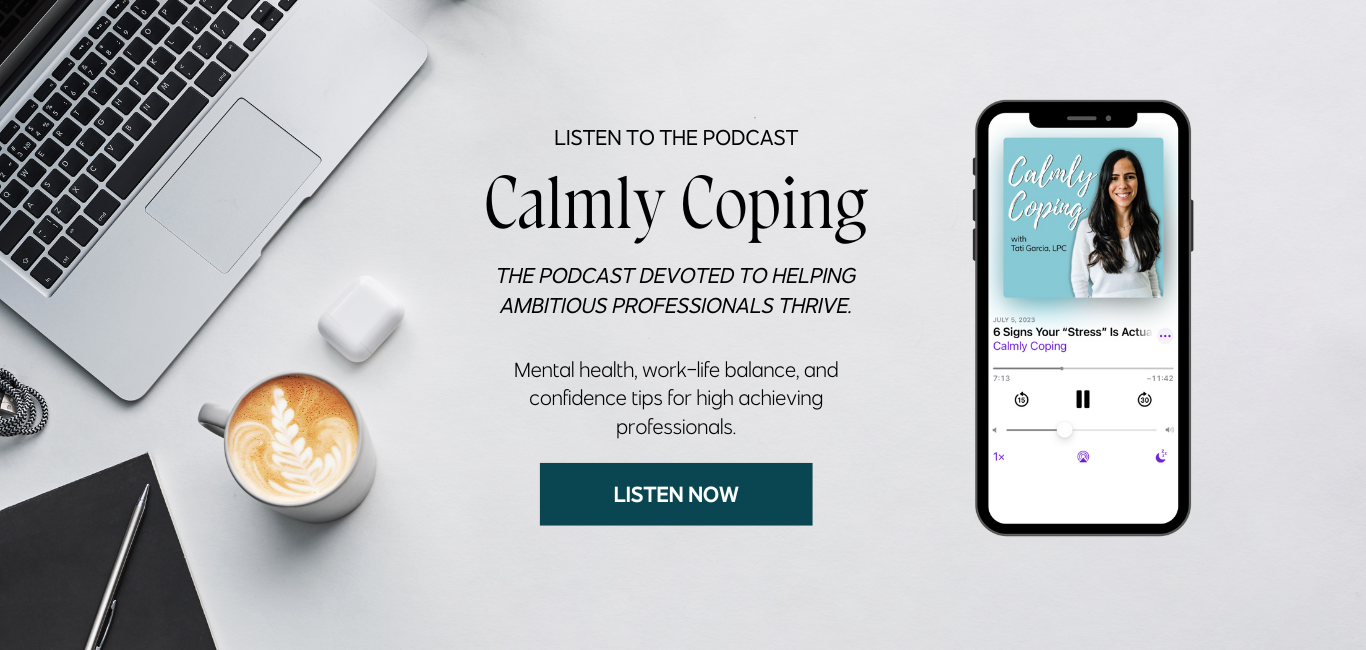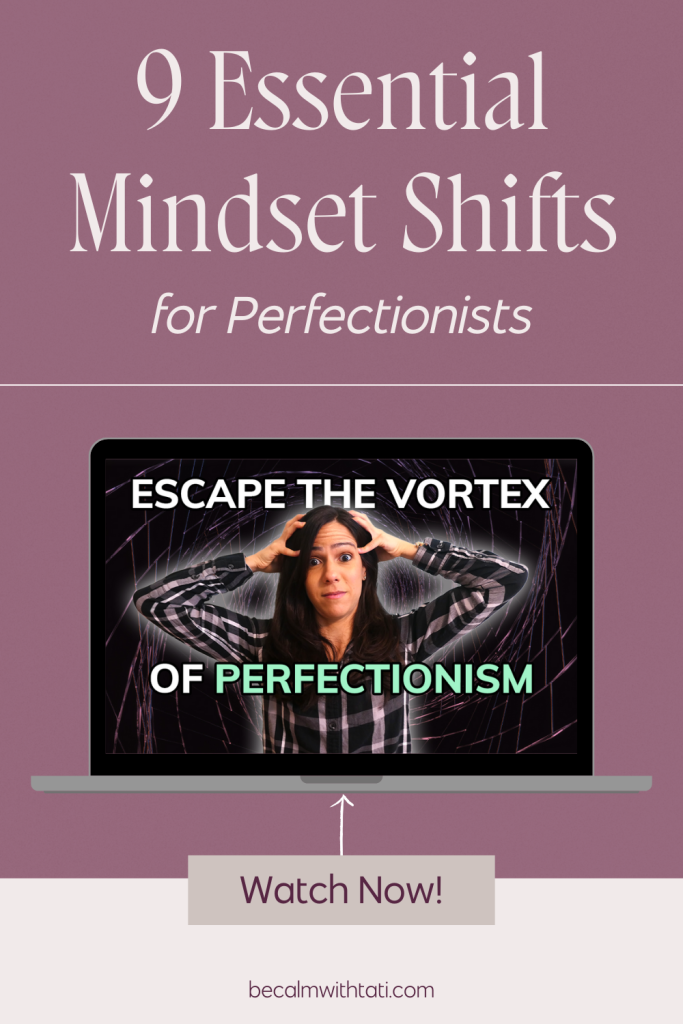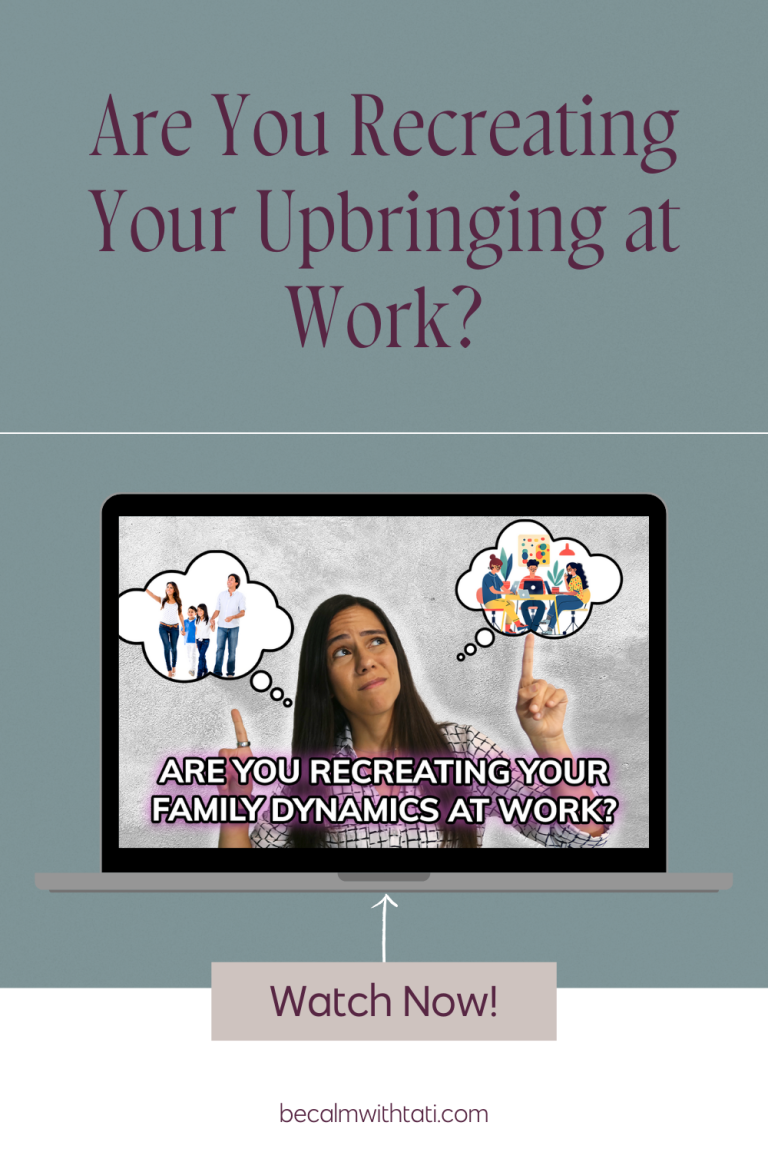Perfectionism can be a double-edged sword: on the one hand, your high expectations and attention to detail can result in high quality work that is admired by others; on the other hand, your constant need for perfection can be exhausting— resulting in overthinking, overanalyzing, and being extremely hard on yourself. In this episode, I’ll be sharing some essential mindset shifts to help you stop struggling and begin thriving as a perfectionist.
In this episode, you will learn:
- Why mindset shifts can be helpful to crush perfectionism
- 9 simple yet powerful mindset shifts to help you stop perfectionism from holding you back
- How to handle overwhelm, mistakes, and criticism as a perfectionist
Mentioned in episode:
Get To The Root Cause Of Your Perfectionism: https://www.becalmwithtati.com/root-cause-of-perfectionism/
https://youtu.be/WU5JhA6zyzM?si=9Jbc6W154tKkq70-
Crush Your Perfectionism Mini Course: http://calmlycoping.com/perfectionism
LISTEN NOW:
🎧 CLICK HERE TO LISTEN TO CALMLY COPING WHEREVER YOU LISTEN TO PODCASTS
WATCH NOW:
FREE TRAINING: How to Create Work-Life Balance and Feel Calmer From Within
If you want to learn how to take back control of your life so you can feel calmer and more confident, and learn the tools to spend your time according to what matters most to you (no matter what your schedule is like right now)…

LISTEN, REVIEW, AND SUBSCRIBE TO THE PODCAST!

INTRO/OUTRO MUSIC: Rescue Me (Instrumental) by Aussens@iter (c) copyright 2018 Licensed under a Creative Commons Attribution (3.0) license. http://dig.ccmixter.org/files/tobias_weber/57990 Ft: Copperhead
DISCLAIMER: All content here is for informational purposes only. This content does not replace the professional judgment of your own mental health provider. Please consult a licensed mental health professional for all individual questions and issues.
Interested in diving deeper to get support for high-functioning anxiety?
I offer 1:1 coaching to help high-achievers overcoming high-functioning anxiety so they can feel calmer, more present, and have improved balance in their lives. Click here if you’re interested in learning more and getting started.
Calm, Balanced, & Confident is my comprehensive A→Z self-paced course to help high-achieving professionals overcome high-functioning anxiety so they can feel calmer, balanced, and more confident without the anxiety and overwhelm. Click here to learn more and enroll today.
Looking for ongoing support and guidance with high-functioning anxiety? The Calm & Ambitious Community is the exclusive community for high achievers with high-functioning anxiety. Click here to learn more and join us today!
TRANSCRIPT:
Click to view the episode transcript.
Perfectionism can be a double edged sword. On the one hand, your high expectations and attention to detail can result in high quality work that is admired by others. On the other hand, your constant need for perfection can be exhausting, resulting in overthinking, overanalyzing, and being extremely hard on yourself.
In this episode, I’ll be sharing some essential mindset shifts to help you stop struggling and begin thriving as a perfectionist. Welcome to Calmly Coping. I’m your host, Tati Garcia. I’m a licensed therapist and a high functioning anxiety coach. Calmly Coping is the podcast for people who struggle with anxiety and high functioning anxiety.
Each Wednesday, you’ll hear informative episodes with actionable tips about decreasing anxiety, adopting a healthy mindset, and managing your time and energy so you can live a calm and balanced life. Let’s get started.
Thank you so much for tuning in. So many of the high achieving professionals that I work with struggle with perfectionism. Perfectionism is essentially a disposition to regard anything that is short of perfection as unacceptable. It’s having very high expectations. And if you’re curious to hear more about the root causes of perfectionism, I have an entire podcast episode on that that you can check out by clicking here (http://calmlycoping.com/perfectionism) or clicking on the link in the description or the show notes.
So it’s when you have high standards, expect nothing less than perfection and put pressure on yourself and possibly others to attain those standards. Because much of perfectionism is rooted in the way that you think, such as all or nothing thinking or black and white thinking. catastrophizing or assuming that things are going to be catastrophic or the worst case scenario is going to happen if you don’t achieve perfection and other negative ways of thinking, then shifting your mindset can help to shift the negative effects of perfectionism.
So here are nine essential mindset shifts. for perfectionists. Number one is to focus on effort versus outcome. So focus on the work you have put in and the journey itself rather than the outcome of the work that you’re doing. Many times, we don’t have control over the outcome, whether that is how other people perceive the work that we’re doing.
Or if it’s something that you literally don’t have control over, like showing up for a job interview and actually getting the job or doing a presentation and how you’re going to get graded if part of that grade is subjective, then fixating on the outcome is only going to result in you feeling some level of helplessness and out of control and dive deeper into overthinking and overanalyzing things.
So one quick mindset shift can be to focus on the effort you’re putting in what you are doing and the journey the process of the work rather than fixating on the end result. Mindset shift number two is to embrace imperfection. Imperfection is human, it is beautiful, and it is completely normal. Every single person has flaws and the sooner that you can embrace The reality of imperfection, then the sooner you can become comfortable with making mistakes and with things being imperfect.
Mindset shift number three is to challenge all or nothing thinking. I briefly mentioned this previously, but all or nothing thinking is when you see things in extremes, you either did perfectly or you failed, and when you challenge all or nothing thinking, it’s all about seeing the middle ground most, if not all things in life are on a spectrum and don’t fall into extremes. So, you know, let’s take introversion and extroversion as an example. Many people identify more as an introvert or as an extrovert when the reality is that most people are going to fall somewhere in the middle. Maybe in certain situations you’re more of an introvert or you’re more towards that end of the scale, but maybe in a situation where you are comfortable with the people around you, you’re more of an extrovert.
This is just an example, but it’s. to demonstrate that most people are not on the extremes. Most situations are not going to be on the extreme ends, and most things are going to fall somewhere in the middle. Just because you overlook one small thing that to you looks huge, doesn’t mean that it is a failure and doesn’t mean that you have completely gone from doing well to doing terribly.
So embrace the shades of gray, embrace the middle ground, embrace the fact that not everything is going to be perfect. If something isn’t perfect, it does not mean you failed. Mindset shift number four is your work is not a reflection of you as a person. Just because you don’t do things perfectly or just because you’ve received negative feedback does not mean that you’re a failure or there is something wrong with you.
When these kinds of thoughts come up, it’s important to have specificity and not generalize. So not say that, Oh, I received negative feedback on this. So this means that I am a bad person or I’m not good at presenting or I’m not. And it’s important to recognize that just because you did poorly once or just because you missed or forgot something or didn’t do up to your standards or expectations does not mean that this says anything about you as a person.
This is specific to this incident. So in this one situation, I didn’t do as well as I would have liked to, and that’s okay. That doesn’t mean that I cannot learn from this and grow from this and improve. So your work does not define you as a person. The next mindset shift is to focus only on the next step.
When you struggle with perfectionism, it’s really easy to get overwhelmed by starting something. Feel overwhelmed because it’s hard to get started on perfection. It can feel like you never have done enough. Like there’s never enough research to be done, or never enough preparation, or never enough work that can be done when you’re getting started on the idea of perfection. Focusing on that big picture can make it feel nearly impossible to get started. So when you focus only on the next steps, only on small steps and breaking down those larger steps into smaller ones, it can feel much more achievable and much more attainable. And it can help you to move forward and not get stuck in analysis by paralysis and trying to overthink and overanalyze everything.
The next mindset shift is to set clear, realistic expectations. So this is just about being clear with what you expect. I know for me personally, I have the tendency to overcomplicate things when I’m getting started on a task, or starting something new, or something that’s a little out of my comfort zone.
And this can make me exaggerate my expectations and feel like I need to do the best and a million different things. But when I am able to recognize this and then actually reflect on and put this in perspective, then that allows me to be realistic and recognize that, okay, I don’t need to overcomplicate things.
How can I make this as simple as possible? How can I set? clear and realistic expectations. When I say clear, I mean, be specific, be very explicit with what it is that you’re expecting from what you’re doing. And then realistic is looking at, okay, with the amount of time, what can I realistically accomplish without putting tons of extra stress and pressure upon myself?
Many times, what we expect for ourselves. is beyond what other people expect from us and what is actually expected in the situation. I was working with a coaching client recently who told me that he was putting a lot of pressure on himself for a specific project that he was working on and he felt like it wasn’t up to his standards, but then when he showed it to the client, they were satisfied with it and beyond satisfied with it.
They were happy with the results and it made him recognize that his expectations were beyond what may have been realistic or may have been expected from who he was doing the work for in the first place. So many times there can be that disparity and when you can set clear and realistic expectations and even look at it from an outside perspective of what other people might expect from you, this can help bring your expectations back down and reduce some of that excess pressure you put on yourself.
The next mindset shift is to see mistakes as opportunities for learning. Everybody makes mistakes and mistakes can be an excellent opportunity to learn. I love to share with my clients when they’re trying something new to view it as an experiment. This takes the pressure off and this can help you to see that this is something that I can experiment with and try and it doesn’t need to be set in stone.
This is something that I can observe and learn from, and then take that forward with me to either continue with it, try something different, make changes, etc. And this applies in any situation, even if the consequences seem serious. We are always learning and growing, and making mistakes is a part of being human.
The next mindset shift is to reframe criticism. Criticism can be gut wrenching when you’re a perfectionist. And it can often be the only thing you focus on when you hear something negative in response to something that you’ve done. Especially when you’ve put so much time and effort into something. So remember that most criticism is given with the intention of being constructive feedback.
Something to help you. Something to give you a different way of looking at things or to help you grow and learn. And if it’s not, if it’s just something that’s rude or disrespectful or mean, then it really says more about the other person than it does about you. And nowadays on the internet, there are plenty of crappy people leaving crappy feedback.
And so if it falls into that category, then just don’t look, ignore, disregard. When it comes to constructive feedback that is from somebody you trust or from somebody that you value their opinion. Then this is an opportunity to learn and to reflect, how can I learn from this and not take it personally?
This connects to what I said previously, that your work is not a reflection of you as a person. Constructive feedback is not personal. It is something that the person is trying to do, most likely with the intention of trying to help you. So I’ve done this with my membership community, the Common Ambitious Community.
I have received probably 95 to 98 percent positive feedback and I’ve also received some constructive feedback. And rather than taking this personally, although you know it might have hurt a little bit at first, I used this constructive feedback as a way to improve the community and make things even better.
And my next mindset shift when perfectionism is to practice self compassion. So, this is being kind to yourself and speaking to yourself as you would to a friend, because we are often harder on ourselves than we are on others. And most people aren’t expecting perfection from you, except for you. So ease up and be kind to yourself.
Be a better friend to yourself. Be a better support. Be a better boss. Be a better blank. Whatever that is, whatever the situation is, be kinder to yourself. And that will help when it comes to dealing with the harshness that can go along with perfectionism. If you’re interested in diving deeper, I have an entire course on how to crush your perfectionism so you can take imperfect action with an inner confident core.
If you’re interested in learning more and enrolling in this course, you can go to http://calmlycoping.com/perfectionism. And let’s continue the conversation about this topic. If you’re watching on YouTube, or if you’re listening on Spotify, I would love to hear your thoughts on this question. What is your biggest struggle with perfectionism and while you wait for next week’s episode, I have other episodes to help you calm your mind, create work life balance and feel more confident from within the next episode.
That would be perfect for you if you haven’t checked it out yet is how to get to the root of your perfectionism. Thank you so much for tuning in today. And until next time, be calm. Thanks so much for listening. If you like what you heard, please share this episode with a friend and please subscribe and leave me a review on iTunes.
Also, remember to check me out online at CalmlyCoping.com and connect with me on Instagram @TatianaGLPC. All content here is for informational purposes only. This content does not replace the professional judgment of your own mental health provider. Please consult a licensed mental health professional for all individual questions and issues.
Till next time, I’m Tati, and this has been Calmly Coping.


Until next time…













